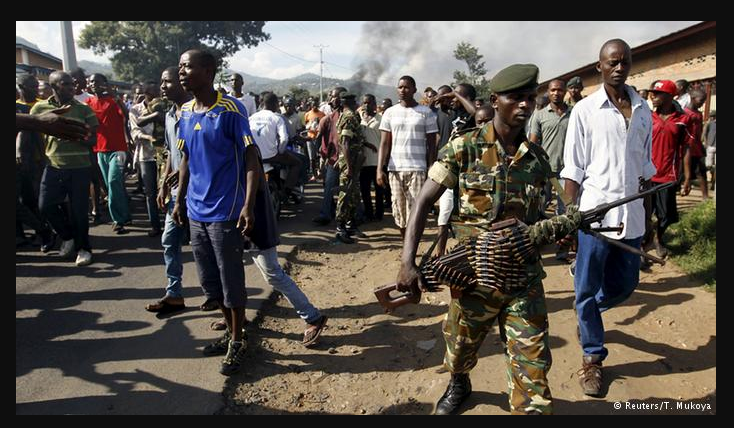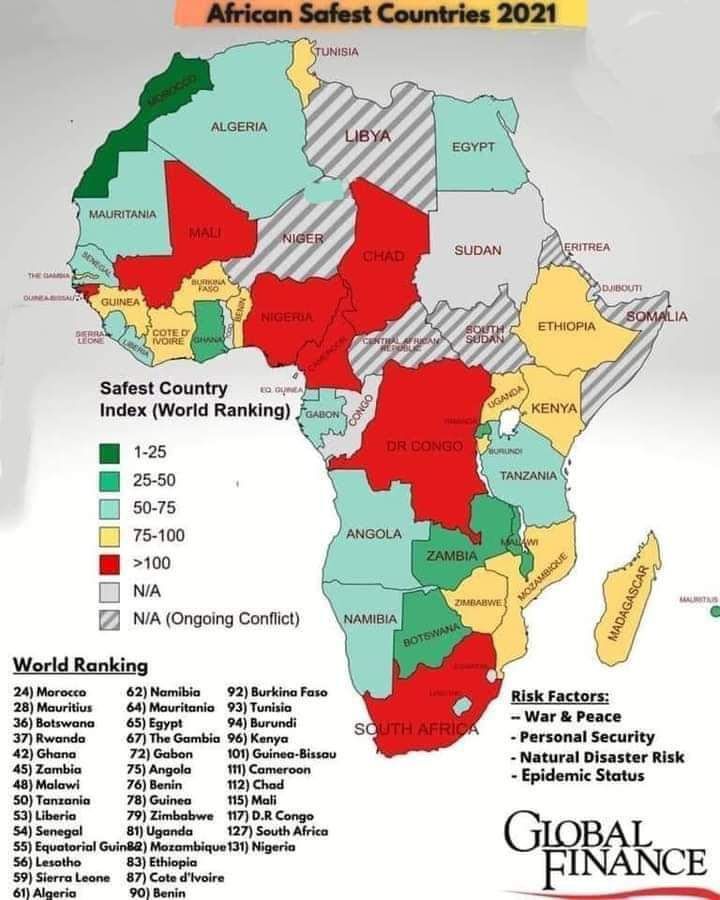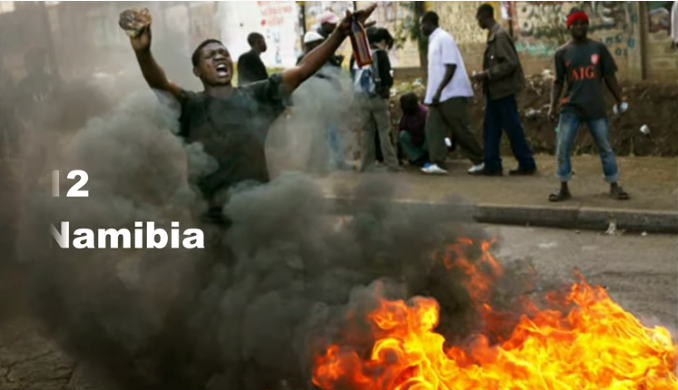
I saw this picture today heading up a post by a Moroccan contact who was very pleased with her country rating the safest place in Africa – nothing wrong with that – It is good to see people having pride in their nation and wanting to celebrate when they find something that is reflecting their nation well.
Anybody who knows me well, or even has become engaged with me over time on LinkedIn, will know that I have a strong personal investment in Nigeria, so my first focus in an African context will be to look at how Nigeria fares.
Obviously I was unpleasantly surprised to find Nigeria bottom of the Africa list. I thought back to the wake of the #ENDSARS protests but then reflected on what recently happened in South Africa in the wake of the jailing of Jacob Zuma and notionally considered South Africa’s situation to be in a more desperate league.
Register for Tekedia Mini-MBA edition 19 (Feb 9 – May 2, 2026): big discounts for early bird.
Tekedia AI in Business Masterclass opens registrations.
Join Tekedia Capital Syndicate and co-invest in great global startups.
Register for Tekedia AI Lab: From Technical Design to Deployment (next edition begins Jan 24 2026).
Equally, when I consider the various paramilitary actors that are beleaguering Nigeria at the moment, while a massive concern, they pale compared to some of the things that have been happening in South Sudan and the Tigray Region of Ethiopia.
So obviously I do what I always do, and go looking for independent validation. Sure enough, searches on ‘ African safest countries 2021’ generated a generous choice of websites to visit, often with very different results.

While Nigeria finished bottom in many, South Sudan finished bottom in several. I didn’t find Morocco safest on any other list, and several cited Botswana. The ‘Africa’ data was generally a subset of global data and while Iceland was quoted world’s safest right across the board, New Zealand ranked #2 on many of the other lists and only #10 on the ‘Global Finance’ list.
So why did all of these sources vary so much? Well the first thing is methodology. If two sources are not using the same measurement criteria, and even then, are not using the same weighting across the criteria set, then the ranking they generate is going to end up being different.
The second thing is that just because content is online somewhere, does not mean it is true. Several of the sites I visited only listed a top 10, interlaced with pleasant pictures and content with a promotional narrative including superfluous information about the featured countries cultures or tourist attractions, and this isn’t required of a site that is strictly ranking countries according to safety issues.
If they are not citing a credible source of their primary data, and they are not explaining the methodology, then this puts their content in doubt.
Internet database Numbeo last year placed my former home, Trinidad and Tobago at #6 in a global list of the most dangerous countries in which Nigeria ranked #17
The ‘Global Finance’ list is detailed and transparent about its methodology and covers over 130 countries globally in its ranking list, though that doesn’t necessarily make it the right reference point for you. So which one would be?
Well, anybody travelling has to consider their own circumstances. One group is people who are travelling to be domiciled somewhere for work. This could be a foreign person or a Diaspora considering repatriating. While most African countries have some sort of immigration protocol that needs to be followed by non indigenes entering a country for work, even with citizenship or permanent status, it’s never a good idea to just move countries jobless. This should only be considered if there are over-riding circumstances, such as a close relative is terminally ill and you are needed at home. Even then, people abroad for long should be aware much may have changed. On arrival, go directly to your best comfort zone, and gradually move out of it cautiously, methodically and deliberately to re-assimilate. Any person from any tropical home, Africa, the Caribbean… returns home after a long period of absence, they don’t look the same. Their skin has this sort of dull, matt complexion. They have lost this glossy magic glow that comes from living in this environment for a sustained period. If I see that, then all local area boys, touts and miscreants are picking that from scope rifle distance like blood hound sniffing the air. Dry fish dey fresh now-oh.
Another group is people who are visiting for a limited time for business and arriving for business meeting. They should only be concerned about the safety of the citie(s) they need to visit and any local commuting they need to do. Stats for a country as a whole might be misleading and unhelpful.
The third group is holiday travelers who want to explore with view to seeing certain types of attractions or participating in certain types of activities. These people need to draw up short lists of countries that offer what they want, and do their security analysis of each country separately.
The fourth group is inter-Africa migrants. Just because an African chooses to leave their own country, it can’t be presumed they want to leave Africa altogether. Regional options may be cheaper to relocate to, and involve less or no immigration red tape. A person may wish to move regionally for what they perceive as better employment opportunities, cheaper cost of basic amenities and supplies, a higher quality of education or a more conducive economic environment to start a new business. Always check to ensure indigenes of a host country have no heightened sensitivity to citizens of your country as this can increase safety concerns on an individual basis.

Different kinds of travelers have variable vulnerability to different types of safety concerns. It is a good idea to check the assessment methodology used by ranking systems are weighted in the direction of the safety concerns of most impact to people on an individual basis. Sometimes the focus is (a) specific city(ies) rather than a country as a whole.
Finally, it is always good to check travel advice from your government on intended destinations if they provide it.
Some of the ranking websites I found:
gfmag.com/global-data/non-economic-data/safest-countries-world
travelinglifestyle.net/most-dangerous-countries-africa
internationalcitizens.com/living-abroad/safest-places/africa.php
youngpioneertours.com/safest-countries-in-africa/
worldpopulationreview.com/country-rankings/safest-countries-in-africa
owupress.com/safest-countries-in-africa-to-visit-in-2021-1456
atlasandboots.com/travel-blog/most-dangerous-countries-in-the-world/
adventuresdream.com/safest-countries-in-africa/
insidermonkey.com/blog/25-most-dangerous-countries-in-the-world-966826/




I’m just searching of the dangerous situations that is happening around the world apparently in the world.